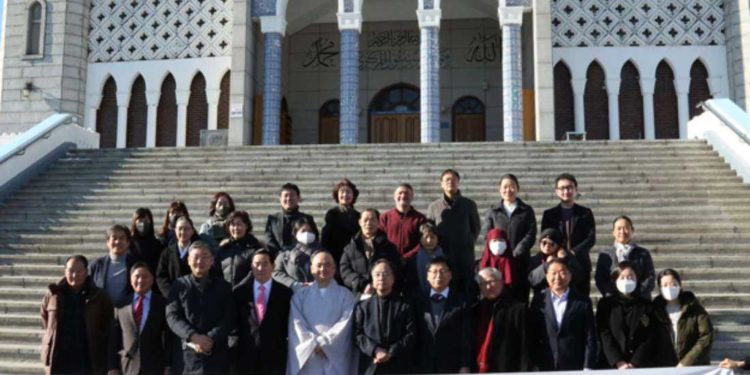Seminar aims to forge better ties with Muslims in a society where prejudices against the religion runs deep
Leaders of various religions in South Korea pose for a photo after an interfaith seminar at Seoul Central Mosque. (Photo: Catholic Times of Korea)
An interfaith group in South Korea organized a seminar to help people clear misconceptions about Islam, including the wearing the hijab, to forge better ties with the minority faith in the country.
The Korean Religious Peace Conference (KCRP) held a public seminar on the dialogue between Korean religions and Islam titled “Islam: Approaching Peaceful Coexistence and Future” from Dec. 5-6 in the capital Seoul, the Catholic Times reported on Dec. 7.
In his opening address, Kim Dong-eok, president of the Korean Muslim Association, emphasized that Islam is a “religion of peace.”


“There are people who misunderstand the true meaning of Islam in Korean society. I hope that many people will understand and cooperate with Korean Islam through this seminar,” said Kim.
“The image of Islam has become increasingly fixed as one of violence, dictatorship, and oppression”
The KCRP was established in 1965 by leaders of six religious groups — Protestantism, Buddhism, Confucianism, Won-Buddhism, Cheondo-gyo, and Catholicism — with an aim to promote dialogue and harmony among followers of various religions.
During the seminar at the Seoul Central Mosque, Imam Lee Ju-hwa discussed the public perception of Islam as a repressive religion due to extremist activities.
“Since the 9/11 terrorist attack in 2001, the image of Islam has become increasingly fixed as one of violence, dictatorship, and oppression.
“When people abandon prejudices and accept each others’ differences, the coexistence of various forms of peoples and religions and true peace can be realized,” he said.
The al-Qaeda terror attack against the United States on Sept. 11, 2001, killed about 3,000 people and triggered the so-called US-led War on Terror. The war ostensibly presented Islam globally as a religion that endorses extremism.
In Korea, the misconception has reportedly influenced the public perception of Muslims.
“Terrorists disguising themselves as asylum seekers”
Earlier in May, Korean media attempted to vilify Muslims over a neighborhood standoff between Muslim immigrants and non-Muslim Koreans over the construction of a mosque in the southern city of Daegu.
The incident came four years after some 550 Yemeni asylum seekers landed on Jeju Island through a 30-day visa-free entry system. The arrival of Muslim refugees was greeted with xenophobic media coverage in South Korea.
Some media also allegedly spread Islamophobia by reporting a “terrorists disguising themselves as asylum seekers” narrative across the nation.
The paranoia resulted in 700,000 Koreans backing an online petition demanding the abolition of the country’s Refugee Act.
Many South Koreans still remember the 2007 kidnapping of 23 Korean missionaries at Saemmul Presbyterian Church by the Taliban in Afghanistan.
Two were killed before the government struck a deal and the captives were eventually released after 40 days.
Earlier in 2004, Kim Sun-il, a Korean interpreter and Christian missionary in Iraq was kidnapped and beheaded by an extremist outfit linked to al-Qaeda.
On the second day of the dialogue program, Park Hyeon-do, chairman of the KCRP Publication Committee led the second part of the seminar titled “Hijab’s Historical Background and Causes of Conflict.”
Park, is a Catholic and faculty member of Myongji University’s Middle East Studies Center which specializes in the study of culture, politics, economy, history, and religion across 22 Arab nations.
Many Koreans view the hijab as a symbol of oppression, says Song Bo-ra who converted to Islam in 2007.
Song said that many Koreans who ask about the hijab wrongly think that it “is used to control women and their freedom, and that we are pressured to wear it,” Singapore’s Straits Times newspaper reported.
Muslims in South Korea are estimated to number around 200,000, or 0.4 percent of the 51.7 million population, according to the Korean Muslim Federation.
Latest News
Credit: Source link


